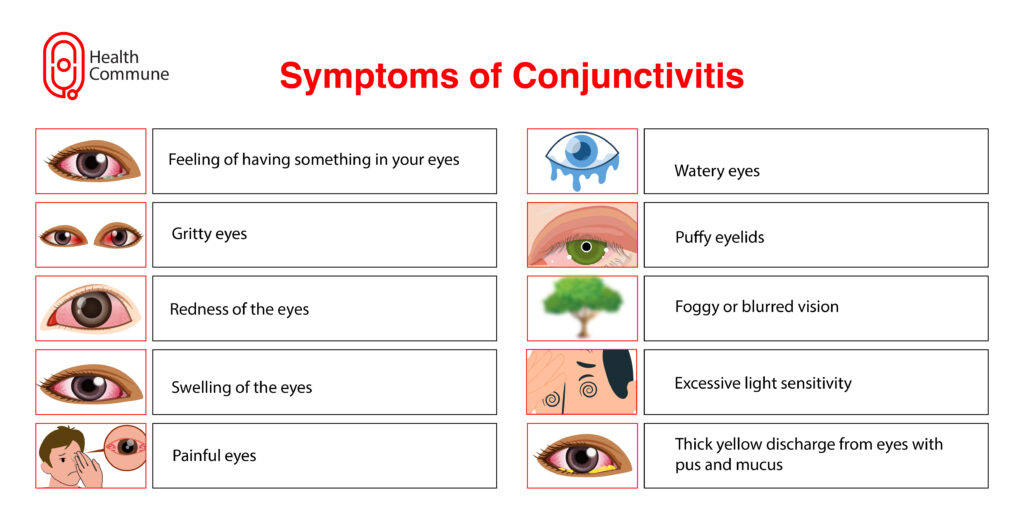Conjunctivitis commonly known as pink eye is the inflammation of the conjunctiva, a thin clear tissue in the eye. It can be extremely contagious and spread quickly, with rarely serious. If you detect it quickly and take care of it, there is very little chance that it may damage your vision. This article gives a clear idea about what is pink eye, it’s symptoms, treatment and complications.
What is conjunctivitis?
Conjunctivitis or pink eye is the inflammation of the conjunctiva, the transparent membrane that lines the eyelid and the eyeball. The swelling and inflammation make the small blood vessels in the conjunctiva more visible, giving it a pink colour.
What are the types of conjunctivitis?
Conjunctivitis may be caused mainly by viruses, bacteria, or by allergies.
- Viral conjunctivitis
- It is the most common and most contagious type of conjunctivitis
- It frequently spreads across classrooms and other crowded settings
- Usually, it results in watery discharge and burning red eyes
- Bacterial conjunctivitis
- It spreads quickly and causes your eyes to be painful, inflamed, and filled with thick, sticky pus
- Pink eye and strep throat are usually caused by the same bacteria
- Allergic conjunctivitis
- This form occurs due to an allergic reaction to pollen, animals, cigarette smoke, pool chlorine, automobile fumes, or any environmental factors
- It is not contagious
- Your eyes may become extremely painful, red, and watery from an allergic pink eye, and your eyelids may swell
Others include:
- Non-specific conjunctivitis
Develops in people who have dry eyes may occasionally or continuously.
When comes into contact with chemicals, dust, eyelash, smoke, and fumes
It may also occur if contact lenses are not properly cleaned - Toxic Conjunctivitis
It is an ongoing inflammation of the eye’s surface brought on by an irritant, typically a preservative or medication

How does conjunctivitis spread?
Both bacterial and viral conjunctivitis can spread easily. The most typical routes for transmission are:
- Direct hand-to-eye contact
- Direct body fluid contact with an infected person
- Use of improperly cleaned contact lenses
What are the symptoms of conjunctivitis?
Some signs of pink eye include:
- Feeling of having something in your eyes
- Gritty eyes
- Redness of the eyes
- Swelling of the eyes
- Itchy eyes
- Painful eyes
- Watery eyes
- Puffy eyelids
- Foggy or blurred vision
- Excessive light sensitivity
- Thick yellow discharge from eyes with pus and mucus
How is conjunctivitis diagnosed?
- In the majority of cases, your doctor may identify pink eye through your recent medical history, symptoms, and an eye examination
- Your healthcare professional may collect a sample of the fluid that drains from your eye for a culture test
- If your symptoms are severe or your doctor thinks you have a high-risk condition like:
- A foreign body in your eye
- Severe bacterial infection
- A sexually transmitted disease
When should I seek medical attention?
Consult with a doctor if you have conjunctivitis presenting with any of the following symptoms:
- Eye pain
- When discharge from the eyes is wiped away, the pain in the eyes, sensitivity to light, or blurred vision do not go away
- Intense redness in the eye
- Symptoms that get worse or do not improve even after 24 hours of antibiotic use
What are the treatments given for conjunctivitis?
Depending on the underlying cause, treatment for conjunctivitis can include:
- Bacterial conjunctivitis
- Generally treated with antibiotics
- Adults are prescribed eye drops
- Children are mostly prescribed ointments for ease of administration
- Viral conjunctivitis
- No particular therapies are necessary for treatment as your body defends itself against the pathogen
- Your eyes may feel more at ease if you place a cool, moist towel on them
- Allergic conjunctivitis
- It is usually treated with antihistamines to reduce irritation
- Both diphenhydramine (Benadryl) and loratadine are antihistamines that are available as over-the-counter medications
How can conjunctivitis be avoided?
One of the best strategies to prevent and stop the spread of conjunctivitis is to maintain proper hygiene:
- Do not touch your eyes, especially with unwashed hands
- Wash your hands thoroughly and frequently with soap.
- To wipe your face and eyes, only use fresh tissues and towels
- Avoid sharing cosmetics, especially eyeliner and mascara
- Regularly wash your pillowcases
What is the ‘life span’ of pink eye pathogens on surfaces?
- Certain bacteria can live for up to two days, but most of them are unable to survive after two to eight hours
- In general, viruses are more resilient; the majority of them survive for 24 to 48 hours. Certain viruses can persist for up to 8 weeks
- When surfaces are cleaned thoroughly, the majority of bacteria and viruses are instantly destroyed by bleach or another antimicrobial cleanser
How long does pink eye usually last?
Your conjunctivitis should typically resolve on its own within 1-2 weeks. If your symptoms persist beyond that point, you must consult an eye specialist (ophthalmologist). They can check whether you have a more serious eye condition.
When I have pink eyes, how can I speed up the healing process?
- Discard your old contact lenses and use new ones
- Do not use any eye makeup while you have conjunctivitis
- If you have bacterial conjunctivitis, cover your eyes for a few minutes with a warm, damp washcloth 4 to 5 times a day
- In case you have viral conjunctivitis, place a cool, damp washcloth over your eyes for a few minutes. You may repeat this 4 to 5 times a day





